
Nowadays, a business having a website is as crucial as having an office, shop, or telephone number.
For a business which is targeting customers in multiple geographical locations, they need to implement a Content Delivery Network or a CDN in their website.
The use of CDN for a business website has been recommended by web developers and marketers if that website is really content-heavy.
It is the best way to significantly improve your website’s loading speed, user experience and SEO. Also, many modern CDNs help in tackling issues related to website security.
Let’s see what a CDN is, how it works, and why you need one for your website.
What is a Content Delivery Network (CDN)
A CDN is a globally-distributed network for servers which enable faster delivery of website content to users around the world.
In other words, CDN helps in increasing the loading speed of your website and thereby provides seamless user experience for your website visitors irrespective of their location.

Without a CDN, the server that hosts your business website must respond to every single request from users. This results in significant traffic to the hosting server and thereby increases its load.
This will in turn increase the chances for server failure if the website traffic peaks or the server load is persistent.
Introducing Maxsemo’s FREE SEO Tools to Boost Your Search Visibility on YouTube.
✓ no ads
✓ free to use
When you implement CDN in your website, majority of the end user requests will be handled by the CDN and thereby offloading traffic from your hosting server.
This will improve the overall web experience, thus benefitting both yourself (as a website owner) and your target audience.
According to Cisco, currently more than half of the global internet traffic is handled through CDNs.
How Does a CDN Works
Let’s use simple example to explain how a CDN works for your business website.
Consider that you run an online shopping store in India. You have built a great website and hosted it on a server, let’s say, located in Hyderabad.
When a user visits your website, everything (whether it is textual content, images, videos, etc) that loads on that website comes from this server in Hyderabad.
Let’s say a user in Abu Dhabi (UAE) is visiting your website. At this time, a request goes from the user’s mobile/desktop to your hosting server, where the website files are stored.
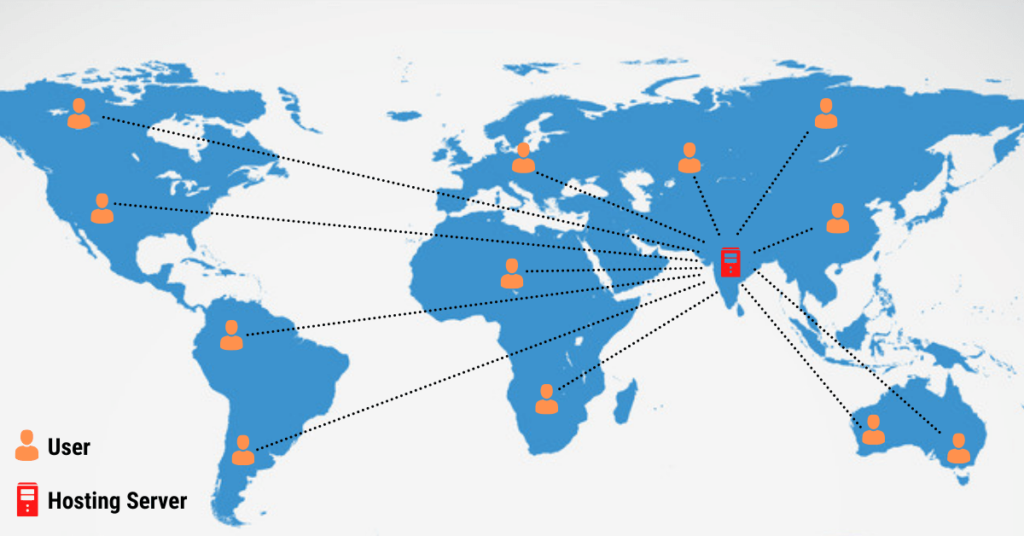
Since the distance between the user and the website hosting server is over thousands of miles apart, your website takes more time to load on the user’s device.
If your website takes more than 3 seconds to load, users will exit your website and never comes back to your site again.
This increases your site’s bounce rate and adversely impacts your online presence and thereby your sales.
Now let’s see what happens when you add a CDN along with your hosting server.
A CDN consists of a network of cache servers (also called edge servers) that are distributed in different parts of the world.
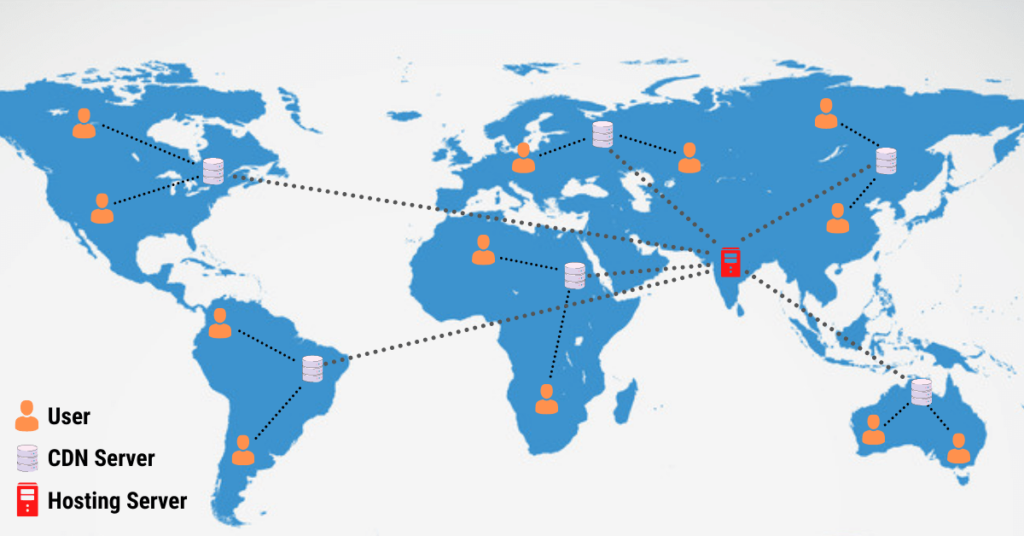
When the user accesses your website from Abu Dhabi, the cache server that is closer to the user’s location will respond to the request instead of the hosting server.
The CDN server will show a ‘cached’ version of your website to the user which reduces the time taken by the website to load on the user’s device significantly.
Instead of storing your whole website, a CDN server store only copies of website content temporarily and show it to users nearby its location.
This kind of arrangement makes your website loads faster, that means happy users and growing sales.
Keep in mind that using CDN is one way of optimizing website loading speed. You need look into other technical aspects of your website to make sure that the site loads faster.
Benefits of Using a CDN
There are alluring benefits you can get by using a CDN, other than optimizing website speed.
- Improves website performance – CDN helps your hosting server respond to user requests (also manage traffic surges) more quickly and thereby improving your website’s performance.
- Protection from attacks – Many modern CDNs are well-suited in defending your website from denial-of-service (DoS) and distributed-denial-of-service (DDoS) attacks.
- Provides free SSL certificates – Nowadays, most CDN providers offer SSL certificates for websites and there are providers who offer it for free of charge.
- Highly redundant – Since CDNs consist of multiple servers spread out in different locations across the globe, they can offer high redundancy. If a CDN server goes down in particular location, other CDN servers can still deliver content to users in that location.
- Helps your website’s SEO – Google considers pagespeed as a ranking signal which means your fast loading website will rank for target keywords in Google search results.
Do all Business Websites Need CDN?
CDN is suitable for those businesses that target global audience and require a faster way to deliver website content.
Also, websites that are content-heavy require CDN to ensure uninterrupted content delivery. These websites include:
- Ecommerce stores
- Online news portals
- SaaS (on-demand/web-based software) applications
- Blogging sites
- Video streaming platforms
- E-learning platforms
- Real-estate search portals
- Job search portals
- Flight and hotel booking portals, and more.
To test the loading speed of your CDN-enabled website, you can use popular tools like GTMetrix, Pingdom, PageSpeed Insights, and Lighthouse (Chrome extension).
7 CDN Providers You Can Consider for Your Business Website
Here are 7 CDN providers you can consider for your business website, and you can choose the provider that perfectly matches with your requirements.
Also, majority of the CDN providers (mentioned below) offers analytics and reporting tabs to monitor content delivery, website traffic, and security threats.
1. Cloudflare
Cloudflare is the most popular CDN service provider as they offer a free plan which is ideal for small websites.
Keep in mind that the free plan has limited DDoS protection and doesn’t come with all the benefits of their paid plans.
Cloudflare is easy to setup and has a large network of globally distributed network of servers in 160+ locations. Their paid plans start at $20/month.
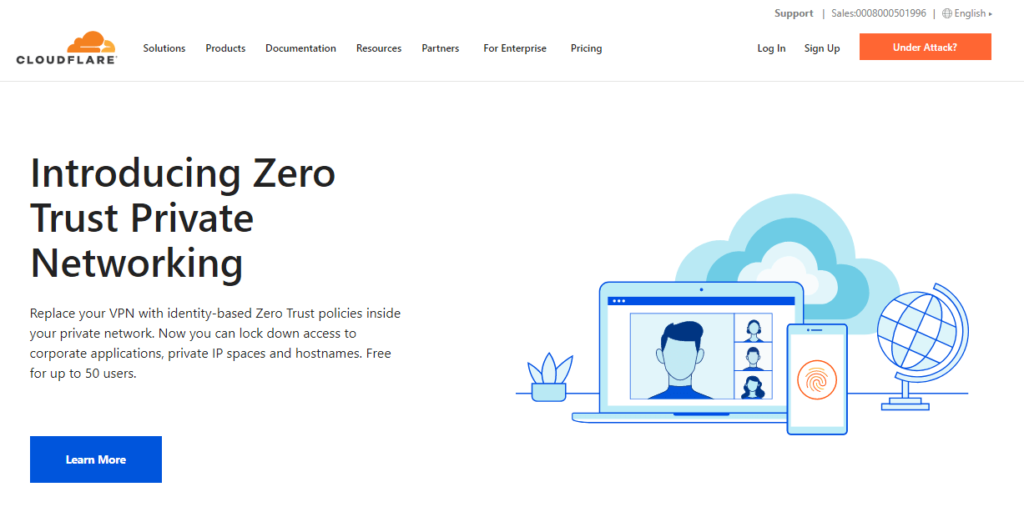
2. KeyCDN
KeyCDN is compatible with major content management systems especially WordPress. It is easy to setup and they charge you as per your usage.
Their plans include a powerful control panel, HTTP/2 support, restful API support, DDoS protection, SSD servers, and provide free, custom SSL certificates.
Instead of locking into a fixed monthly payment, the pricing plans of KeyCDN are based on location and usage.
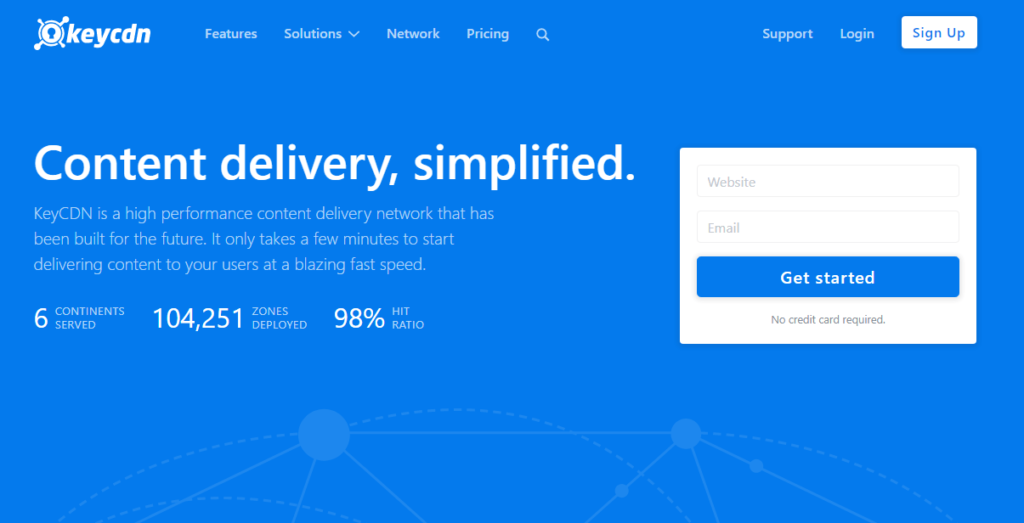
3. CacheFly
CacheFly is mostly preferred by enterprise businesses as their pricing plans starts from $595/month.
All of their plans consist of the usual CDN features including DDoS and malware protection.
They also offer ‘fully managed CDN’ plan for their premium customers with on-demand technical support, advanced features, and dedicated account management.
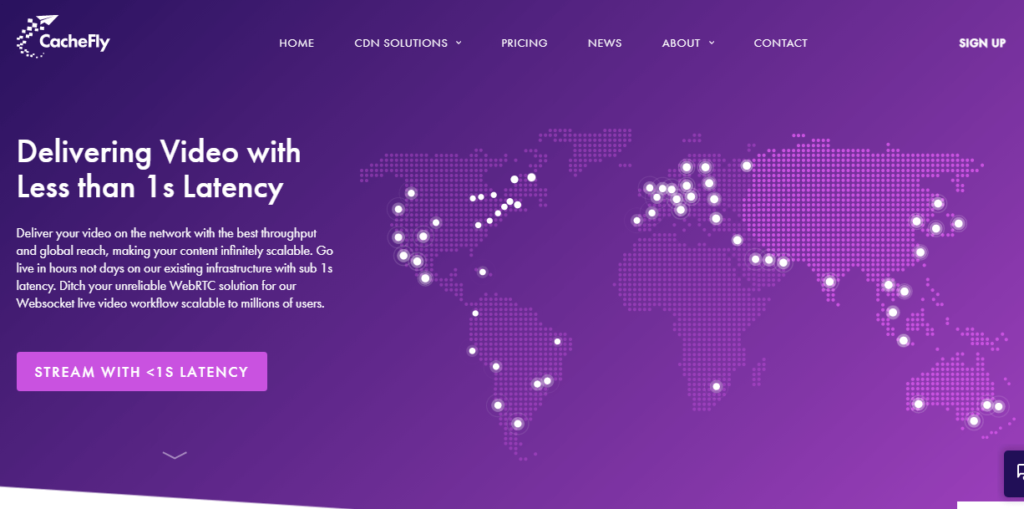
4. Fastly
Fastly is a well-known name among enterprise businesses and they possess edge computing capabilities that help developers to build and deploy their applications.
Fastly provides DDoS and bot protection, API protection, web application firewall, and other advanced security measures.
When it comes to pricing, they charge per month based on bandwidth usage. They also offer fully managed CDN for those businesses that require on-demand support.
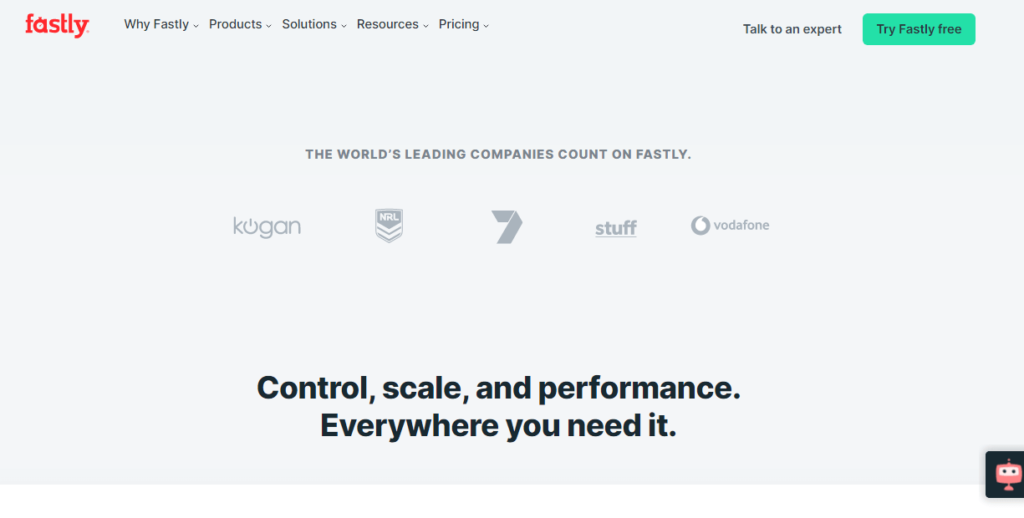
5. Amazon CloudFront
Amazon CloudFront is a part of Amazon Web Services (AWS) which works seamlessly with any web hosting provider including its own services like Amazon E3 and Amazon EC2.
It has most advanced security capabilities (derived from AWS) that give protection from network and application layer DDoS attacks.
You can also customize your content delivery through CloudFront using its secure and programmable edge-computing features.
When it comes to pricing, you need to pay as per data usage and the number of HTTP/HTTPS requests. You can also check out their free plan which is limited to one year.
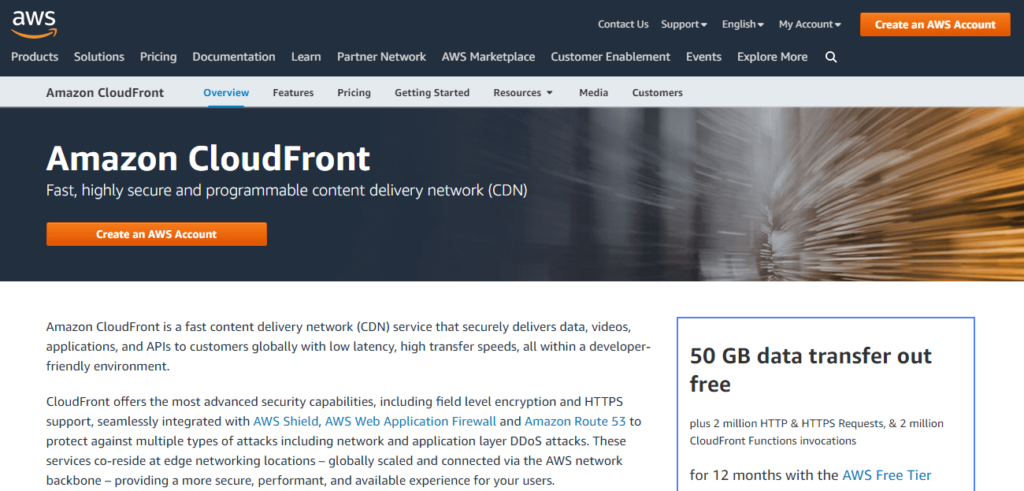
6. Google Cloud CDN
Google Cloud CDN uses Google’s global server network to deliver content and to speed up your websites and applications.
Since it is a part of Google’s cloud computing platform, it provides an array of developer-friendly tools to build and deploy your web and mobile applications.
Similar to CloudFront and Fastly, Cloud CDN is mostly preferred by high end users especially from the tech sector.
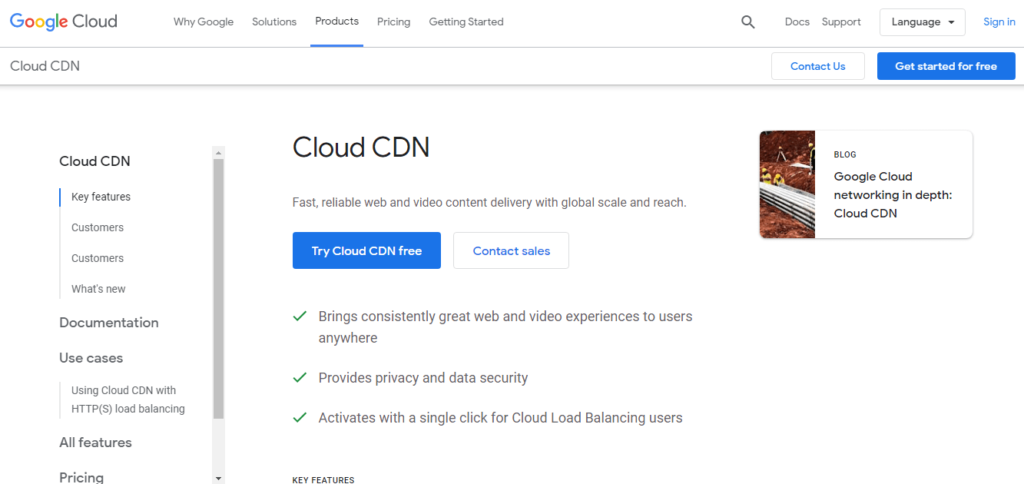
7. Azure CDN
Microsoft also offers CDN services through its Azure cloud computing platform.
Azure CDN has massive global presence, robust security, developer-friendly tools, advanced analytics, and deep integration with Azure services.
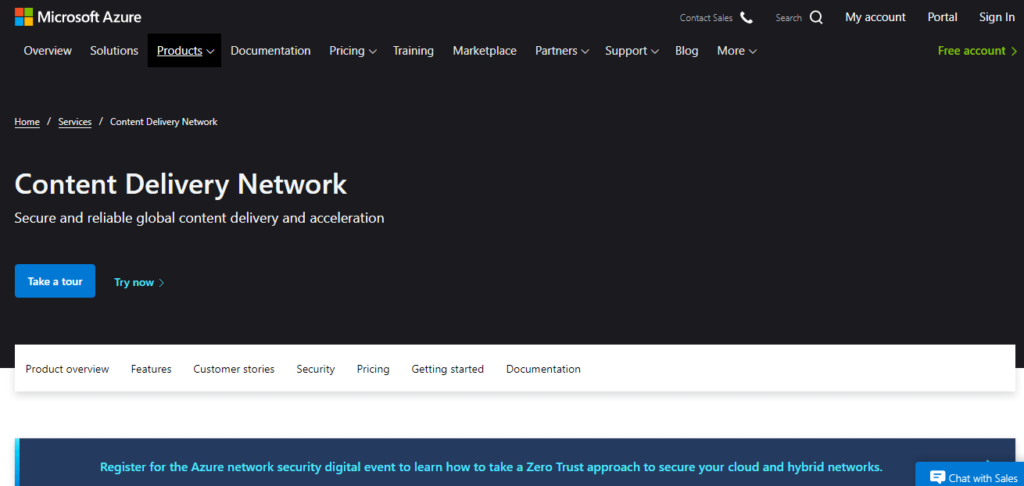
Conclusion
With more and more businesses coming online, the demand for faster web content delivery has also increased accordingly.
Here CDN helps in fulfilling that demand thereby improving user experience and sales numbers for your business.
What do you think of using CDN for your business website?
Let’s have a conversation in the comments section.

Very much informative article on CDN!
Thank you, Chinmay.
Hello, a great post, I am trying to configure CDN on my WordPress website but finding it difficult to install. I have a hosting from Bluehost and I’ve got a Free CDN from them which is showing active on the hosting panel but in WordPress it is not active, can you help me how to do it
Hi Hasan,
Hope you found my blog post helpful. You can get in touch with Bluehost support team to fix your CDN issue.